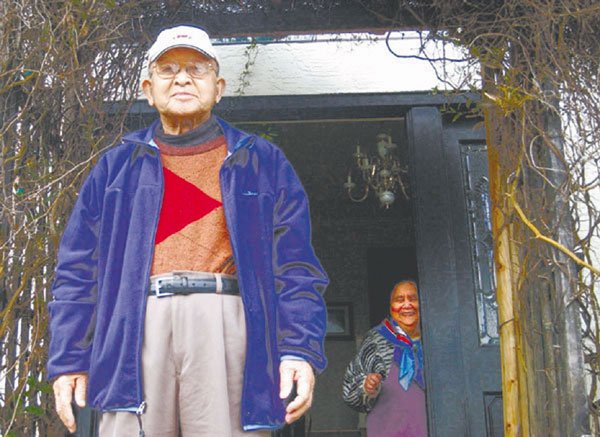Family and friends remember Zenichiro Uchida, who helped 1,500
find their way to the U.S.
Gilroy – Zenichiro Uchida’s final moments were spent the way he lived – with dignity, honor and respect. The 84-year-old consoled and advised each of his family members before lifting his weak arms, grabbing the face of his wife of 57 years, hugging her and whispering, “Thank you.”
Uchida, who is considered the father of more than 1,500 immigrants from Kagoshima, Japan, died Thursday morning at his Gilroy home after battling lung and kidney cancer since the summer of 2005.
“As far as his death, it was the most beautiful and the most courageous experience for all of us who were here,” said his son Ted. “I think we all grew from it.”
Uchida used all of his energy to maintain his independence and spend time with family members and friends.
“If he moved an inch, he groaned a little bit – they were there. And every time they did that my dad said ‘Thank you,'” Ted said. “You talk about a saint, I thought we were looking at one. We feel very honored to be his blood, his son, his grandchildren.”
In January, Uchida was celebrated at the 50th anniversary of the Kagoshima Immigrants Association for his dedication to fostering peaceful relations between Japan and the United States following World War II.
During the war he served as a second lieutenant in the Japanese Imperial Army and surrendered to the American troops in the Philippines. Upon surrendering he was surprised by their kindness, and returned to convince other soldiers to do so instead of dying in the mountains.
According to Ted, Uchida believed life had more to offer.
In 1953, he was sent to California on a cultural exchange program to learn American farming techniques. The experience inspired him to immigrate to the U.S. and on his return trip to Japan, he tried to convince others of the opportunities available abroad.
“He was a rebel,” Ted said, explaining how his father openly criticized the Japanese government and served as the youngest city councilman in his district. He started a letter writing campaign to the U.S. Congress that made hundreds of visas available to Japanese immigrants.
But life wasn’t easy for those who chose to leave.
The original 325 men who came to work in America struggled in labor camps the first three years and suffered from homesickness. Uchida traveled back and forth from Japan consoling and encouraging their families.
“My dad was their husband and father,” Ted explained.
As a young boy, Ted understood that his father had obligations to the children and families of the men he convinced to start fresh an ocean away.
“I had to step aside if those kids were there to share our father with everybody else,” he said. “He had that tenacity, that never give up attitude for what he believed. He always told me that Americans had big enough hearts that they would take Japanese into America … And they did.”
Uchida helped Japanese immigrants begin a life in the Central Valley. Many began as farmers, others branched off to become lawyers and doctors.
At the anniversary celebration in January, he gave one final public speech in Japanese, which Ted translated into English for audience members.
Uchida rose from his wheelchair to speak for 20 minutes as an individual knelt behind him for support while he stood.
He spoke without note cards, without preparation beforehand.
“I was really amazed at the way people responded to him, children and adults alike,” said Jack Foley, who was in attendance. “He was held in Ghandi-like reverence. Over the years he’s helped an awful lot of people. The reality today is there are thousands of people who can say if it wasn’t for him, their lives would be different. This is a very unique and special person. He’s going to be missed and remembered.”
According to Ted, in the weeks before his death, Uchida learned that he was being honored by the office of the Japanese Emperor with the Order of the Rising Sun Gold and Silver Ray – the highest award given to a civilian – for his efforts and sacrifices over the years. Ted and his mother, Shizuko, will travel to the Japan to receive the award in his honor.
Since 1978, Uchida had owned and operated the Zen Flower Garden on Monterey Road. During the 1980s, Uchida began a sister city program between Gilroy and Takko-Machi, Japan.
“I was a beneficiary of his vision,” said Gene Sakahara, former Rod Kelley Elementary School principal.
In the early 1990s, Sakahara took students to Japan for a two-week exchange program to promote good relations and additional understanding between the two countries.
Sakahara believes Uchida’s vision included sharing the wisdom that “there were more similarities than differences among the countries,” he said. “I think that was part of his goal.”
Just before he died, Uchida tapped Ted, who had served as his voice, his legs and his strength, to lead the family into the future.
“Now you’re ready. Now you’re complete,” he told him. “Your world is going to change when I die. Take advantage of it. Use it in a powerful way – to help others.”
Uchida is survived by his wife, Shizuko, his daughter, Tomiko, eight grandchildren and one great-grandson.
“His legacy is our family. What he’s done is to leave us the children something that we could be very very proud of,” Ted said. “What he gave us is a big smile.”
Funeral services will be held Tuesday, April 4, at 2pm, at the Buddhist Temple of Salinas, 14 California St., Salinas.














